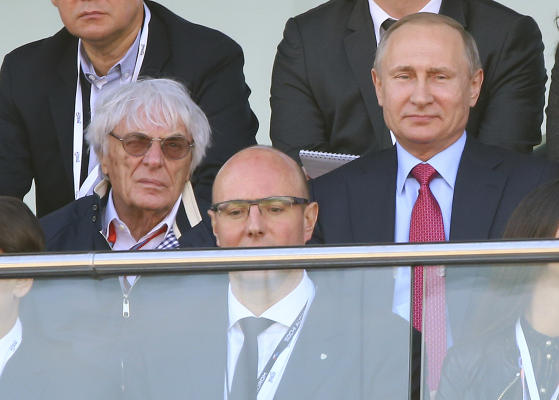Those following the ‘Syrian Uprising’ and its repercussions during the last five years have been torn between two positions: the first, giving international stances – especially, Russia’s – the benefit of the doubt based on the assumption that regardless of the strength of its alliance with a certain regime, no government would ever keep quiet about genocide. The second, and much more realistic, expected that at least Russia would stick with the Assad regime come what may.
In the beginning, Russia’s and China’s use of the ‘Veto’ at the UN Security Council in order to prevent any decisive action against the Assad regime – after it decided to deal with its people by mass murder and uprooting – alerted many to the notion that Moscow’s interests in Syria were plentiful and complex. However, the overall picture remained ‘hazy’ for those who preferred to view Moscow’s position merely as a ‘We Are Here’ message to the USA and Europe; aiming to warn them against disregarding its interests as they did in Libya.
This was how some read the situation after the first ‘double Russo-Chinese Vetoes’; but an increasing number of those began to change their minds after the third ‘double Vetoes’, and began to notice a seriousness and stubbornness in the Kremlin expressed in the ugliest way by Foreign Secretary Sergei Lavrov and the media ‘security – linked’ mouthpieces commentating on the crisis in the Arab and world media. By then it became crystal clear to many that reality was much more that ‘reminding’ and warning, and was becoming much more sinister; more so as Washington’s true position was unfolding parallel with its political and nuclear ‘normalization’ with Tehran, and the collapse of its false Syrian ‘red lines’.
In fact, it did not take long for the USA to prove it was not a ‘friend of the Syrian people’ – if it ever was – but rather became a neutral actor at best. Subsequently, meetings between the US Secretary of State John Kerry and Russia’s counterpart Lavrov, became more like cordial social occasions than serious discussions aimed at solving serious problems against the background of massacres and suppression throughout Syria, not forgetting those perishing in the sea and suffering in refugee camps.
During the last few years, as President Barack Obama abandoned the plight of the Syrian people, by claiming that his top priority was fighting ISIS, Moscow did not stop at supporting the Assad regime militarily and diplomatically, but started working diligently to destroy the genuine Syrian opposition, and ‘fabricate’ a fake opposition composed mostly of the regime’s intelligence ‘puppets’.
Unfortunately, as Moscow embarked on this plan, it succeeded in exploiting certain political sensitivities of some Arab governments, which has helped the Kremlin in creating this ‘puppet’ fake opposition and forcing it on the negotiating table. This would mean that any serious political dialogue becomes a ‘chat’ between the regimes and its creations, reproducing the same gang that would continue what it has been doing, but using new ‘fresh’ faces.
Still, on its own such Russian endeavours would not have been enough, given the failure of Iran’s ‘multi-national’ militias to win its battles on the ground, and the ability of the opposition forces to maintain their momentum and sense of purpose despite all attempts to undermine them, politically through ‘fake’ opposition, and militarily through ISIS which has been fighting the opposition with full collusion from the regime. Furthermore, there have been fears within Syria’s religious and sectarian minorities of the outcome of Iran’s hegemony, whether through its IRGC or its expropriation of lands through forced uprooting, evictions and dubious ‘purchases’ from absentee landowners (i.e. refugees).
The above-mentioned factors, namely the ‘steadfastness of the popular Uprising’ and the ‘fears of minorities’ – especially, the Christian communities – seem to have convinced Moscow of the necessity of direct military intervention. This, evidently, was made easier in September 2015 thanks to the ‘Obama Doctrine’ based on siding with ‘Political Shi’ism’ throughout the Middle East against the extremist face of ‘Political Sunnism’ as represented by ISIS and ‘Jabhat An-Nusra’ (Al-Qa’eda’s branch in Syria).
Today, while Russia and Iran are fighting alongside the regime, Washington has been severing all its past commitments to the Syrian Opposition, cementing its links with the Iraqi premier Haider Abadi – a prominent face of regional ‘moderate Political Shi’ism’ –, and launching a ‘strategic movement’ with the Kurds of Iraq and Syria that threatens to speedily break up the two countries, and perhaps Turkey too. At the moment, Washington is dealing politically, militarily and financially with the leadership of the ‘Kurdistan Autonomous Region’ in Iraq as a fully-fledged independent state. With regards to Syria, Washington has turned a blind eye to Iran’s direct military involvement, fully adopted Moscow’s ‘interpretations’ of almost all agreements reached in Geneva, and kept quiet towards Moscow’s attempts to create a ‘puppet’ opposition through which it plans to undermine any genuine negotiations leading to a political settlement.
This American position, as previously mentioned, could be explained by the ‘Obama Doctrine’, but no less important is the need to comprehend the Russian ‘scenario’ given that Washington is fully behind it.
The serious nature of how Russia is acting in the Near East is underlined not only by the visit of Qassin Suleiman, the commander of ‘Al-Quds Brigade’ in Iran’s IRCG to Moscow against Washington’s ‘deafening silence’, or Moscow’s insistence that a separate pro-Moscow Kurdish delegation takes part in any future Syria talks, but also underlined by the continuous Russian dialogue with Israeli Prime Minister Binyamin Netanyahu.
Israel is definitely a crucial player in every game played in the Near East, and any thought that it may ‘distance itself’ from its politics, problems and future maps is absolute nonsense.
Yes, Israel is a major and effective player whose interests are taken seriously in Washington, Moscow and even Tehran; and thus, no future maps are going to be drawn in the region without its knowledge, approval and regard to its interests and desire
